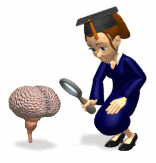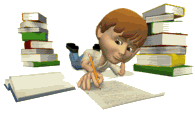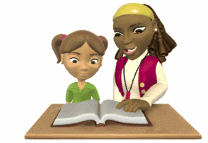Happy Holidays!
 I am thrilled to announce the release of Honors Physics Essentials, an algebra-based physics book designed to assist beginning physics students in their high school and introductory college physics courses as an invaluable supplemental resource in class as well as a review guide for standardized physics assessments such as the SAT Subject Test in Physics, PRAXIS Physics, and CST Physics exams. You can find it online at Amazon.com for only $12.95.
I am thrilled to announce the release of Honors Physics Essentials, an algebra-based physics book designed to assist beginning physics students in their high school and introductory college physics courses as an invaluable supplemental resource in class as well as a review guide for standardized physics assessments such as the SAT Subject Test in Physics, PRAXIS Physics, and CST Physics exams. You can find it online at Amazon.com for only $12.95.
Honors Physics Essentials is an easy-to-read guide to algebra-based introductory physics, featuring more than 500 worked-out problems with full solutions and covering topics such as: kinematics, dynamics, momentum, impulse, gravity, uniform circular motion, rotational kinematics, work, energy, power, electrostatics, circuits, magnetism, microelectronics, waves, sound, optics, thermal physics, fluids, and modern physics.
The 384-page 6”x9” paperback book is integrated with the APlusPhysics.com website, which includes online question and answer forums, videos, animations, and supplemental problems to help students master Honors Physics Essentials. You can find more information at http://www.aplusphysics.com/honors. Volume discounts and e-book versions are available, as are class and site licenses for electronic versions starting as low as $3 per student.
I have so many people to thank for their contributions to this endeavor that I hardly know where to begin. First, I’d like to thank all the fans of the first book, Regents Physics Essentials (RPE), and fans of the APlusPhysics website. It was your requests, feedback, and encouragement that prompted the writing of this book. Following the release of RPE, reader response was tremendous, and your requests for a similar book extending beyond the scope of the NY Regents Curriculum that could be used in physics classrooms across the country as well as for standardized test preparation made the development of this book a personal necessity.
Second, I must thank my two outstanding editors, Jeff Guercio and Joe Kunz, who graciously took many hours out of their busy lives to help make this book (and Regents Physics Essentials) clear, concise, and readable. I’d also like to thank my student Emily, who first proposed turning our course notes into a review book, and Andrew, who reinforced that you can do anything if you set your mind to it. I’d also like to thank Muse, whose enthusiasm for this book has been contagious.
Last, but certainly not least, I’d like to thank all the teachers and professors who contributed to this endeavor. In attempting to write a physics book that would serve the needs of Honors Physics students across the country (and beyond), the input of these teachers and professors has been instrumental in tailoring this book to the needs of a majority of students, while at the same time keeping the length (and cost) low enough to remain attractive to its intended audience.
I’ve enjoyed working on this project throughout the past two years, but as in any extended project, I’m breathing a sigh of relief to have reached the finish line (at least for now). I hope you find the APlusPhysics website and family of resources a useful tool in your study / instruction of physics, and I look forward to growing our online learning community in the coming years. Thank you, thank you, thank you, and best wishes on an amazing 2012!
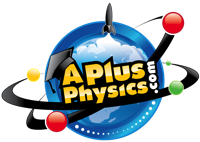
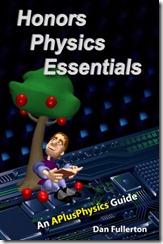 Honors Physics Essentials
Honors Physics Essentials